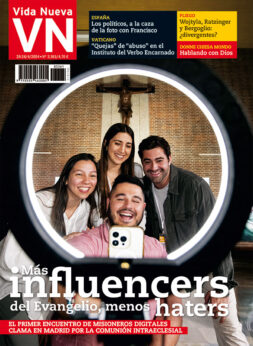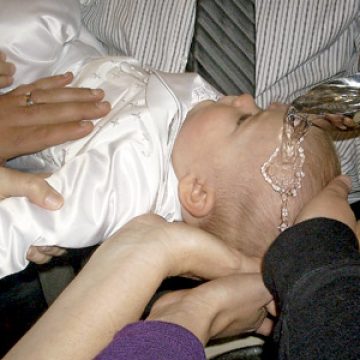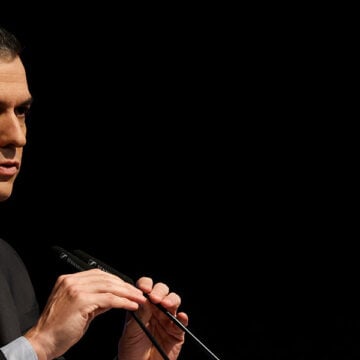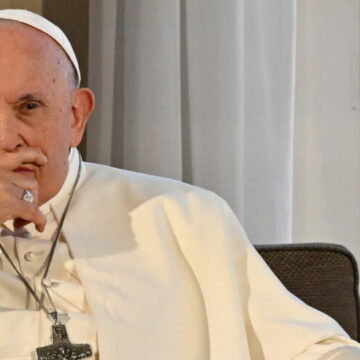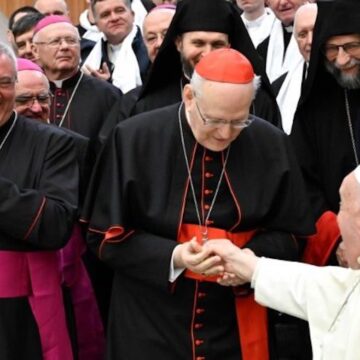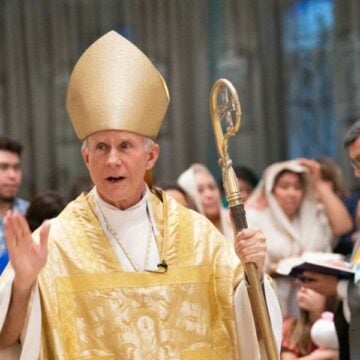Declaración del presidente del Episcopado de Estados Unidos (USCCB) y arzobispo de Loisville, Joseph E. Kurtz, por el aniversario de los 50 años de la promulgación del Civil Rights Acts.
![]()
Declaración con motivo del 50 aniversario de la Ley de Derechos Civiles
“El que dice: «Amo a Dios» y no ama a su hermano, es un mentiroso. ¿Cómo puede amar a Dios, a quien no ve, el que no ama a su hermano, a quien ve? Este es el mandamiento que hemos recibido de él: el que ama a Dios debe amar también a su hermano. (1 Juan 4, 20-21)
Mientras Estados Unidos celebra durante este año el 50º aniversario del Acta de los Derechos Civiles de 1964, me uno a mis hermanos obispos en recordar el historial heroico de ese logro. Honramos a tantos líderes cívicos, de negocios y religiosos, a estudiantes, trabajadores, educadores y todos los que de buena fe y con valor defendieron la justicia racial contra la intolerancia, la violencia, la ignorancia, y el miedo. Recordamos con agradecimiento los incontables sacrificios personales que realizaron, sacrificios que frecuentemente conllevaron dificultades, violencia y hasta la muerte. Honramos la victoria que lograron tras una larga y prolongada lucha civil y legislativa.
Estamos especialmente agradecidos por las contribuciones esenciales de la comunidad de fe durante este periodo. Impulsados por sus valores y creencias, miembros de distintas confesiones y denominaciones religiosas, incluyendo a católicos, insistieron en que la justicia racial en los Estados Unidos era imprescindible y no se podía soslayar. Inspirados en las Sagradas Escrituras, fortificados por la oración y la música espiritual, y sostenidos por el amor a Cristo, numerosos cristianos trabajaron con y para los pobres y marginados, notablemente en el segregado Sur del país.
También unimos nuestra voz a aquellos obispos católicos que repetidas veces hablaron en contra del racismo como lo demuestran declaraciones de la organización predecesora a USCCB en 1943, 1958 y en 1963. En la declaración de 1963, Sobre la armonía racial, los obispos condenaron las injusticias de la segregación racial señalando que ésta “implica que las personas de una raza no pueden asociarse con las de otra…No podemos conciliar esa opinión con el punto de vista cristiano sobre la naturaleza del hombre y de sus derechos.” También insistieron en que “la discriminación basada en el hecho accidental de la raza o el color… no puede reconciliarse con la verdad de que Dios ha creado a todos los hombres con igualdad de derechos y de dignidad”. Un número de obispos—incluyendo el Arzobispo Ritter (St. Louis, 1946), el Arzobispo O’Boyle (Washington, D.C., en las décadas de los años1940 y 50), el Arzobispo Rummel (New Orleans, también en los 50 y 60), y el Cardenal Sheehan (Baltimore, 1963) —trabajaron para desegregar las escuelas, hospitales y otras instituciones católicas, claramente enviando la señal con sus palabras y acciones de que la discriminación racial no tiene lugar en la Iglesia o en la sociedad.
En otra declaración pastoral posterior, los obispos fueron más allá llamando al racismo por lo que es: “El racismo es un pecado: un pecado que divide a la familia humana, excluye la imagen de Dios entre miembros específicos de esa familia, y viola la dignidad humana fundamental de aquellos llamados a ser hijos de un mismo Padre.” (Brothers and Sisters to Us: U.S. Catholic Bishops’ Pastoral Letter on Racism, 1979) La Iglesia permanece como una voz profética y debe continuar insistiendo sobre la dignidad de todas las personas y la oportunidad muy real, disponible para cada uno de nosotros, de tener un encuentro personal con Cristo y ser instrumentos de su sanación, amor y verdad. Como mi hermano obispo, el Obispo Joseph Perry ha dicho, “La Iglesia continua siendo la fuente principal de sanación y esperanza para la gente…Seguimos necesitando de la Iglesia profetas y agentes de reconciliación, individuos y grupos, laicos y miembros del clero que se responsabilicen de unir a la gente a pesar de diferencias obstinadas y conflictos que garantizarían muros de separación en nuestra sociedad.” (1998)
Hace cincuenta años, el Acta de los Derechos Civiles ofreció una rama de olivo de esperanza para un tratamiento igualitario y oportunidades de educación, empleo y completa participación en la sociedad. La legislación prometió una mejor calidad de vida para millones de estadounidenses que habían sido excluidos de los privilegios de la ciudadanía basándose en su raza, color, nacionalidad, y por otros motivos. El Acta defendió la dignidad humana y extendió protecciones legales que comenzaron a transformar comunidades alrededor del país.
El Acta de los Derechos Civiles fue un enorme avance y, desde entonces, hemos progresado aún más en este trabajo vital de transformar corazones y mentes, pero aún hay mucho más por hacer. El Acta por sí misma no erradicó el legado de la esclavitud, la discriminación racial y la injusticia. De hecho, diariamente hay recordatorios a través de la nación de que las brasas de la discriminación racial todavía están candentes. Este mal infecta instituciones, leyes y sistemas, y daña a nuestros hermanos y hermanas. Por ello debemos continuar trabajando contra la influencia destructiva del racismo en las familias, comunidades religiosas y civiles, en las prácticas de empleo, el sistema de prisiones, de vivienda, y sobre el hambre, el rendimiento académico, y la salud mental.
Mientras reflexionamos en el trabajo que ha sido logrado y lo que queda por hacer, deseo mencionar las contribuciones especiales e incansables del Reverendo Dr. Martin Luther King, Jr. La primavera pasada, tuve el privilegio de participar junto a una delegación de líderes cristianos en un simposio ecuménico en Alabama donde reflexionamos sobre su renombrada “Carta desde la Cárcel de Birmingham” en la presencia de su hija, la Reverenda Bernice King. En su carta, el Dr. King abogó por una acción fuerte y oportuna para levantarnos “de las arenas movedizas de la injusticia racial a la roca sólida de la dignidad humana”. Espero que continuemos esforzándonos por alcanzar esa “roca sólida de la dignidad humana” en el presente y honremos con gratitud los sacrificios de las acciones y los escritos del Dr. King.
En conclusión, el Evangelio requiere la transformación continua personal y social. Respetar la dignidad de cada persona es primordial al tratar de difundir por el mundo la belleza de la verdad de Dios. No podemos desanimarnos. Como el Papa Francisco nos recuerda, “Llevar el evangelio es llevar la fuerza de Dios para arrancar y arrasar el mal y la violencia; para destruir y demoler las barreras del egoísmo, la intolerancia y el odio; para edificar un mundo nuevo.”
Al conmemorar los logros notables que dieron lugar al Acta de los Derechos Civiles y otros movimientos significativos hacia la justicia para todos los hijos de Dios, continuemos portando el estandarte y sigamos adelante para amarnos los unos a los otros como nuestro Señor nos amó (Jn 13:34). Y al hacerlo, recordemos las palabras del Dr. King escritas desde su celda en la cárcel: “Tengamos la esperanza de que las nubes oscuras del prejuicio racial pronto pasarán y la profunda neblina de la incomprensión se levantará de nuestras comunidades saturadas de miedo, y que en un futuro no muy distante las radiantes estrellas del amor y la hermandad brillarán sobre nuestra gran nación con todo su esplendor.”
Joseph E. Kurtz
Arzobispo de Louisville, Kentucky
Presidente de la Conferencia de Obispos Católicos de Estados Unidos
9 de septiembre de 2014, Memorial de San Pedro Claver
![]()
Statement on the Occasion of the 50th Anniversary of the Civil Rights Act
“If anyone says, ‘I love God,’ but hates his brother, he is a liar; for whoever does not love a brother whom he has seen cannot love God whom he has not seen. This is the commandment we have from him: whoever loves God must also love his brother” (1 John 4:20-21).
As America celebrates the 50th anniversary of the Civil Rights Act of 1964 this year, I join together with my brother bishops in recalling the heroic history of that achievement. We honor the many civic, business, and religious leaders, students, laborers, educators and all others of good will who courageously stood up for racial justice against bigotry, violence, ignorance, and fear. We remember with deep gratitude the countless personal sacrifices they made, sacrifices that all too often included hardship, violence, and even death. We honor the victory they won after such a long and sustained civil and legislative struggle.
We are especially grateful for the vital contributions of the faith community during this period. Propelled by their values and beliefs, members of different faiths and denominations, including Catholics, insisted that racial justice in the United States was an imperative, no longer to be ignored. Inspired by Holy Scripture, fortified by prayer and spiritual music, and sustained by a love for Christ, a number of Christians worked with and for the poor and marginalized, notably in the segregated South.
We also join our voice to those Catholic bishops who repeatedly spoke against racism as evidenced by statements from the USCCB’s predecessor organization in 1943, 1958 and again in 1963. In the 1963 statement On Racial Harmony, the bishops condemned the injustices of segregation saying that it “implies that people of one race are not fit to associate with another…We cannot reconcile such a judgment with the Christian view of man’s nature and rights.” They further insisted that “discrimination based on the accidental fact of race or color…cannot be reconciled with the truth that God has created all men with equal rights and equal dignity.” A number of bishops—including Archbishop Ritter (St. Louis, 1946), Archbishop O’Boyle (Washington, D.C., 1940s and 50s), Archbishop Rummel (New Orleans, 1950s and 60s), and Cardinal Sheehan (Baltimore, 1963)—worked to desegregate Catholic schools, hospitals, and other institutions, clearly signaling by their words and actions that racial discrimination has no place in the Church or in society.
In a later pastoral statement, the bishops even more directly named racism for what it is: “Racism is a sin: a sin that divides the human family, blots out the image of God among specific members of that family, and violates the fundamental human dignity of those called to be children of the same Father.” (Brothers and Sisters to Us: U.S. Catholic Bishops’ Pastoral Letter on Racism, 1979) The Church remains a prophetic voice and must continue to insist on the dignity of all persons and the very real opportunity available to each of us, to have a personal encounter with Christ and to be instruments of His healing, love, and truth. As my brother bishop, Bishop Joseph Perry has said, “The Church remains the principal source of healing and hope for people… We continue to need from the Church prophets and agents of reconciliation, individuals and groups, laity and clergy who make it their responsibility to bring people together despite stubborn differences and the conflicts that would guarantee walls of separation in our society.” (1998)
Fifty years ago, the Civil Rights Act offered an olive branch of hope for equal treatment and opportunities for education, employment, and fuller participation in society. The legislation promised a better quality of life for millions of Americans who had been excluded from the privileges of citizenship based on race, color, national origin, and other grounds. It championed human dignity and provided legal protections that began to transform communities around the country.
The Civil Rights Act was a monumental step forward and since then, we have made even more progress in this vital work of transforming hearts and minds, but there is still much work to do. The Act itself did not eradicate the legacy of slavery, racial discrimination and injustice. In fact, there are reminders across our nation today that the embers of racial discrimination still smolder. This evil infects institutions, laws, and systems, and it harms our brothers and sisters. We must therefore continue to work against the destructive influence of racism on families, religious and civil communities, employment, the prison system, housing, hunger, educational achievement, and mental health.
While reflecting on the work that has been accomplished and that which remains to be done, I wish to mention the special and untiring contributions of Rev. Dr. Martin Luther King, Jr. Last Spring, I had the privilege to join a delegation of Christian leaders at an ecumenical symposium in Alabama where we reflected on Dr. King’s renowned Letter from Birmingham Jail in the presence of his daughter, the Rev. Bernice King. In his letter, Dr. King advocated for strong, timely action to lift us “from the quicksand of racial injustice to the solid rock of human dignity.” I hope we will all continue to strive for that “solid rock of human dignity” today and to honor with gratitude the sacrificial labors of Dr. King’s writings and actions.
In conclusion, the Gospel requires ongoing personal and social transformation. Respecting the dignity of each person is paramount as we seek to spread the beauty of God’s truth throughout our world. We cannot give in to discouragement. As Pope Francis reminds us, “Bringing the Gospel is bringing God’s power to pluck up and break down evil and violence, to destroy and overthrow the barriers of selfishness, intolerance and hatred, so as to build a new world.”
As we commemorate the notable achievements that resulted in the Civil Rights Act and other significant movements toward justice for all God’s children, let us continue to take up the banner and press forward to love one another as our Lord loved us (Jn 13:34). And, as we do so, we recall the words of Dr. King written from his jail cell, “Let us all hope that the dark clouds of racial prejudice will soon pass away and the deep fog of misunderstanding will be lifted from our fear drenched communities, and in some not too distant tomorrow the radiant stars of love and brotherhood will shine over our great nation with all their scintillating beauty.”
Joseph E. Kurtz
Archbishop of Louisville, Kentucky
September 9 2014, Memorial of St. Peter Claver
- IGLESIA EN EL MUNDO: La discriminación racial en EE.UU., con “las brasas aún candentes” (solo suscriptores)

